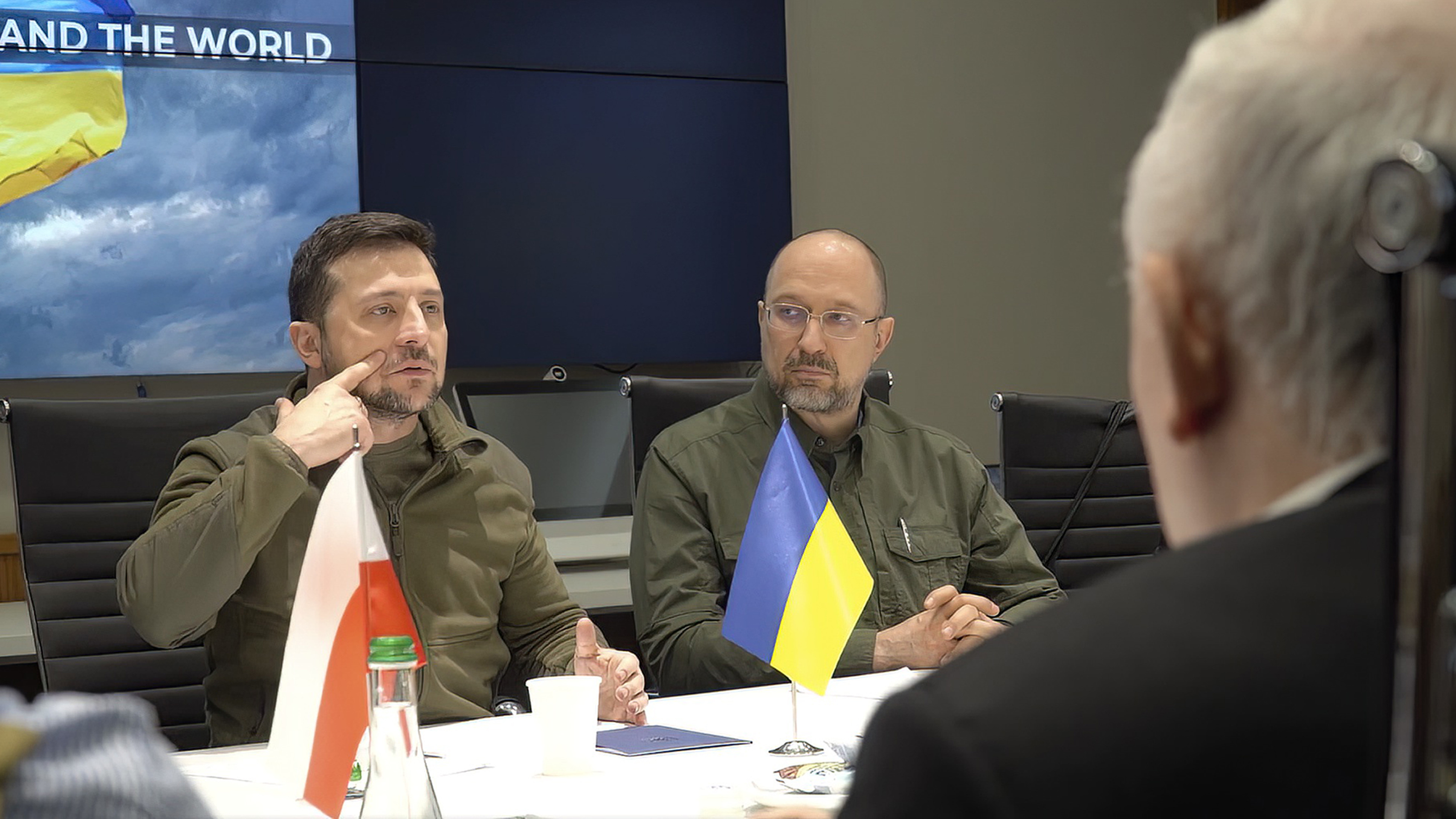The arrival of a number of Central European leaders in Kyiv in the middle of a war has been met with glowing praise in Ukraine

The visit of the leaders of Poland, Czechia and Slovenia to Kyiv in the midst of war has been heralded as a sign of courage and solidarity, and which has prompted Ukrainian President Volodymyr Zelensky to say that Ukraine can only win with such allies.
“I am convinced that with such friends, with such countries, neighbors and partners, we truly will succeed and win,” said Zelensky said after his meeting with Central European politicians in Kiev.
Prime Minister Mateusz Morawiecki, Deputy PM and Law and Justice (PiS) leader Jarosław Kaczyński, Czech Prime Minister Petr Fiala and Slovenian Prime Minister Janez Janša visited Kyiv on Tuesday and took part in a meeting with Ukrainian President Volodymyr Zelensky and Prime Minister Denys Shmyhal.
The Central European leaders traveled by train to the Ukrainian capital, which is currently being attacked by Russian forces.
After the talks in Kyiv, Zelensky thanked the leaders for their support, especially when many ambassadors had left Ukraine following the Russian invasion.
“These people, the leaders of their amazing, independent countries, are not afraid. They worry more for our fate and are here to support us, and this is a very strong, valorous and friendly step,” he declared.
The Ukrainian president stated that he absolutely trusted those countries and leaders.

“This is why we speak about security guarantees, about our future in the European Union, or we speak about sanction policy. We know that everything that we have discussed will reach its goal and will have a positive aim for our country, security and future,” he added.
Polish Prime Minister Mateusz Morawiecki emphasized his country’s unwavering support for Ukraine. “We will never abandon you. We will not because we know that you are fighting not only for your own homes, your own homeland, freedom and security — you are also fighting for ours. We are here today to admire your fight against such a brutal aggressor. This invasion must end,” he declared.
He stressed that Ukrainian children, mothers and wives who had fled the country were safe, and those who were being killed by Putin would never be forgotten.
Morawiecki emphasized that the European Union had to give Ukraine the status of a candidate state as soon as possible.
He also announced that Ukraine had to receive defensive weaponry and pledged that the leaders would try to organize it from every corner of the world.
Jarosław Kaczyński meanwhile expressed his respect for Zelensky, as well as for Ukrainian Prime Minister Denys Shmyhal and the entire Ukrainian nation. He emphasized that in addition to the aid mentioned by Zelensky, another rule which was commonly accepted by the West had to be changed.
“I believe that a NATO peace mission is necessary, or perhaps even of some broader international agreement. But this mission must also be able to defend itself and operate in Ukrainian territory,” he said.
Czech Prime Minister Petr Fiala underlined that the visit was meant to show support for the Ukrainian’s fight and for the Ukrainian state.
“You are not alone. Our countries stand with you. Europe stands with you,” he declared.
Opinion: Courageous show of solidarity with Ukraine
The Polish, Czech and Slovenian premiers visited Kyiv as a show of solidarity with Ukraine. A sign of courage with huge symbolic force, says DW's Bartosz Dudek.

The three European leaders went to Kyiv to show their solidarity with Ukraine
On August 12, 2008, Russian troops were marching towards the Georgian capital, Tbilisi. Suddenly a delegation of five leaders turned up in the city: The presidents of Poland, Lithuania, Latvia, Estonia and — Ukraine.
Before setting off from his country, Polish President Lech Kaczynski had said that the Russian state had once again "shown its true face."
Speaking on a central square in Tbilisi in the name of his fellow leaders, he said that Russia believed that all the nations surrounding it should be subordinated to it.
"And we say: No!" he said defiantly. "What I want to tell you and tell our friends from our shared European Union is that Central Europe, Georgia and our whole region is going to have a say […]. And we also realize all too well that what has befallen Georgia today may befall Ukraine tomorrow, the Baltic States a day after, and then perhaps also my own country: Poland."
Now, 14 years later, the first part of his prophesy has come true. President Vladimir Putin's Russia has attacked Ukraine. The apocalyptic images of destroyed cities, dead civilians and millions of fleeing refugees have dominated the headlines for weeks.
Currently, the Russian army is at the gates of the capital Kyiv. And we all look on in horror.
Act of pure symbolism
That a delegation of leaders from Poland, the Czech Republic and Slovenia chose this moment to go to Ukraine is extremely significant. As is the fact that Polish Prime Minister Mateusz Morawiecki was accompanied by his official deputy, Jaroslaw Kaczynski, the twin brother of the late Lech Kaczynski.
This visit was an act of pure symbolism. The idea was to send a message to the Western world that Poland and Russia's other neighbors were right even if they were not listened to. It says: We were right and today we stand resolutely at Ukraine's side.
One can criticize the policies of Jaroslaw Kaczynski, but on Tuesday, he and his colleagues were in the right place at the right time. That they, of all people, were the ones representing values that are non-negotiable for the whole West: the right to freedom, to self-determination and to territorial integrity, is telling. They showed — and gave — courage. The Ukrainians will never forget.
But now the question remains: Are these the only leading politicians of the free world willing to break out of their comfort zone and stand up for Western values at personal risk?
Where is the French president of the Council of the European Union? Where are the heads of the European Council and the European Commission?
Where are the German politicians who have been feeding Russia military machine with their energy dollars for decades? Those who now — rightly — are accused of having the blood of Ukrainian women and children on their hands?











